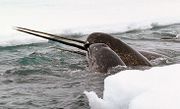Difference between revisions of "Narwhal tusk"
Jump to navigation
Jump to search
| (One intermediate revision by the same user not shown) | |||
| Line 4: | Line 4: | ||
The long, straight, spiraled tusk of the narwhal, ''Monodon monoceros'', that is native to the Arctic Ocean. The male narwhal has two teeth, one of which continually grows forward from the left side of its upper jaw. The second tooth forms a smaller tusk on the right side. The left tusk can grow up to 8 feet in length and is hollow for most of its length. The [[dentin|dentin]] is close-grain, white, and more brittle than elephant ivory. Cross sections show wavy, concentric bands with occasional cone-shaped nodes bounded by bright translucent areas (Thornton 1981). | The long, straight, spiraled tusk of the narwhal, ''Monodon monoceros'', that is native to the Arctic Ocean. The male narwhal has two teeth, one of which continually grows forward from the left side of its upper jaw. The second tooth forms a smaller tusk on the right side. The left tusk can grow up to 8 feet in length and is hollow for most of its length. The [[dentin|dentin]] is close-grain, white, and more brittle than elephant ivory. Cross sections show wavy, concentric bands with occasional cone-shaped nodes bounded by bright translucent areas (Thornton 1981). | ||
| − | [[File: | + | [[File:Narwhal-Walrus-Carving a grande.jpg|thumb|Carved Narwhal ivory <br>Credit: Boone Trading]] |
== Synonyms and Related Terms == | == Synonyms and Related Terms == | ||
| − | narwal; narwhale; narwhal ivory; sea | + | narwal; narwhale; narwhal ivory; sea unicorn ivory |
| − | == | + | == Physical and Chemical Properties == |
UV autofluorescence is buff and white. | UV autofluorescence is buff and white. | ||
| − | == | + | ==Resources and Citations== |
| − | J.Thornton, "The Structure of Ivory and Ivory Substitutes", AIC Preprints, Philadelphia, 1981, p.173-181 | + | * J.Thornton, "The Structure of Ivory and Ivory Substitutes", AIC Preprints, Philadelphia, 1981, p.173-181 |
| − | |||
| − | |||
* Oppi Untracht, ''Jewelry Concepts and Technology'', Doubleday & Co., Inc., New York City, 1985 | * Oppi Untracht, ''Jewelry Concepts and Technology'', Doubleday & Co., Inc., New York City, 1985 | ||
Latest revision as of 09:26, 23 September 2022
Description
The long, straight, spiraled tusk of the narwhal, Monodon monoceros, that is native to the Arctic Ocean. The male narwhal has two teeth, one of which continually grows forward from the left side of its upper jaw. The second tooth forms a smaller tusk on the right side. The left tusk can grow up to 8 feet in length and is hollow for most of its length. The Dentin is close-grain, white, and more brittle than elephant ivory. Cross sections show wavy, concentric bands with occasional cone-shaped nodes bounded by bright translucent areas (Thornton 1981).
Synonyms and Related Terms
narwal; narwhale; narwhal ivory; sea unicorn ivory
Physical and Chemical Properties
UV autofluorescence is buff and white.
Resources and Citations
- J.Thornton, "The Structure of Ivory and Ivory Substitutes", AIC Preprints, Philadelphia, 1981, p.173-181
- Oppi Untracht, Jewelry Concepts and Technology, Doubleday & Co., Inc., New York City, 1985
- The Dictionary of Art, Grove's Dictionaries Inc., New York, 1996 Comment: F.Minney 'Ivory'
- Benjamin Burack, Ivory and Its Uses, Charles E. Tuttle and Co., Vermont, 1984
- Hermann Kuhn, Conservation and Restoration of Works of Art and Antiquities, Butterworths, London, 1986
- Random House, Webster's Encyclopedic Unabridged Dictionary of the English Language, Grammercy Book, New York, 1997
- The American Heritage Dictionary or Encarta, via Microsoft Bookshelf 98, Microsoft Corp., 1998

